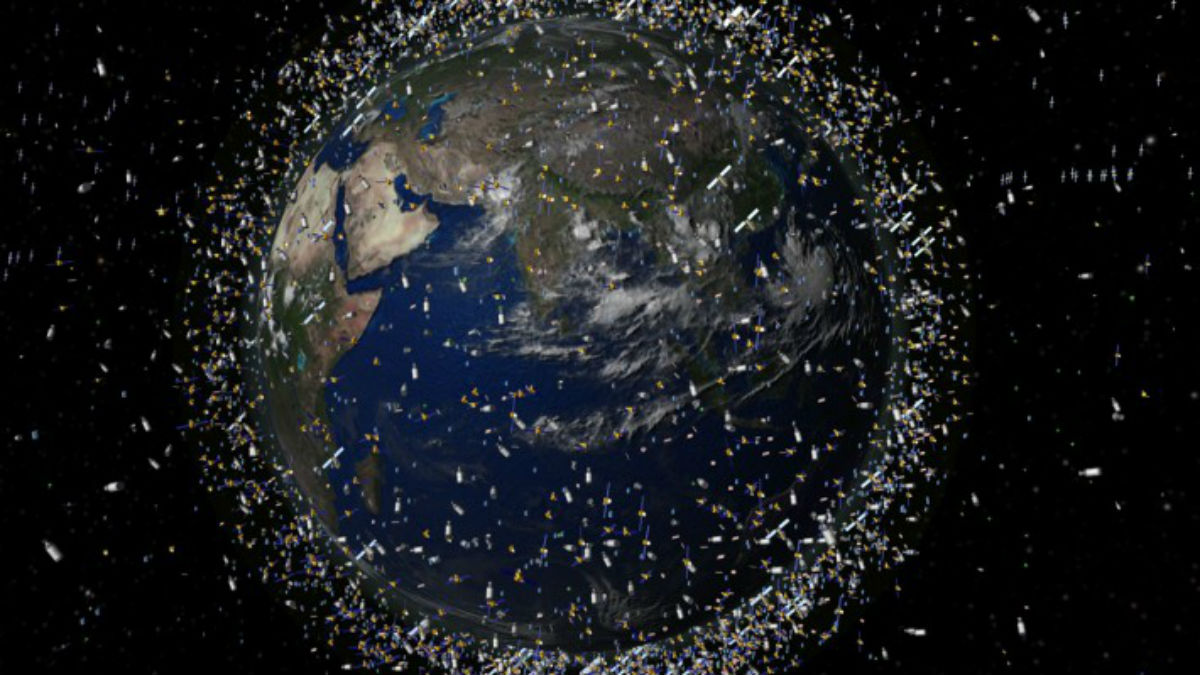How space junk could lead to war
Russian scientists warn growing level of debris in orbit around Earth may trigger conflict

A free daily email with the biggest news stories of the day – and the best features from TheWeek.com
You are now subscribed
Your newsletter sign-up was successful
Scientists have warned that the growing quantity of debris in space could trigger armed conflict if it were to collide with military satellites.
How did we get to this point?
As the number of space missions increases, so does the rubbish they leave behind. There are thought to be more than half a million pieces of debris larger than a marble cluttering up Earth's orbit. Travelling at speeds of 17,000mph, these pieces of broken-up rockets and out-of-commission satellites pose a huge risk to spacecraft. Even tiny flecks of paint can be dangerous at this velocity, says Nasa.
The Week
Escape your echo chamber. Get the facts behind the news, plus analysis from multiple perspectives.

Sign up for The Week's Free Newsletters
From our morning news briefing to a weekly Good News Newsletter, get the best of The Week delivered directly to your inbox.
From our morning news briefing to a weekly Good News Newsletter, get the best of The Week delivered directly to your inbox.
The International Space Station has had a number of close calls, with astronauts frequently having to perform manoeuvres to avoid collisions. The Russian spacecraft Blits was disabled when it was apparently struck by Chinese space junk in 2013, says The Guardian.
What are the likely consequences?
The loss of military satellites to space debris could "provoke political or even armed conflict between space-faring nations", says Vitaly Adushkin, from the Russian Academy of Sciences. Writing in an article for the journal Acta Astronautica, he says there are only two possibilities when a defence satellite suddenly fails: an unregistered collision with space debris or an aggressive action by an adversary. "This is a politically dangerous dilemma," he says.
What's being done to clean up space?
A free daily email with the biggest news stories of the day – and the best features from TheWeek.com
From lasers to robotic arms, a number of bold suggestions have been made. The European Space Agency is currently leading the way with a project called e.Deorbit, which involves capturing rubbish and burning it up through a controlled re-entry into the atmosphere. Member countries will vote on whether to approve the €150m (£114m) mission in December. Project manager Robin Biesbroek has underscored the importance of finding a solution – and fast. "We are getting collision warnings almost every week for some of our satellites," he has said. "We really need to do something."
-
 Why is the Trump administration talking about ‘Western civilization’?
Why is the Trump administration talking about ‘Western civilization’?Talking Points Rubio says Europe, US bonded by religion and ancestry
-
 Quentin Deranque: a student’s death energizes the French far right
Quentin Deranque: a student’s death energizes the French far rightIN THE SPOTLIGHT Reactions to the violent killing of an ultraconservative activist offer a glimpse at the culture wars roiling France ahead of next year’s elections
-
 Secured vs. unsecured loans: how do they differ and which is better?
Secured vs. unsecured loans: how do they differ and which is better?the explainer They are distinguished by the level of risk and the inclusion of collateral
-
 Epstein files topple law CEO, roil UK government
Epstein files topple law CEO, roil UK governmentSpeed Read Peter Mandelson, Britain’s former ambassador to the US, is caught up in the scandal
-
 Iran and US prepare to meet after skirmishes
Iran and US prepare to meet after skirmishesSpeed Read The incident comes amid heightened tensions in the Middle East
-
 Israel retrieves final hostage’s body from Gaza
Israel retrieves final hostage’s body from GazaSpeed Read The 24-year-old police officer was killed during the initial Hamas attack
-
 China’s Xi targets top general in growing purge
China’s Xi targets top general in growing purgeSpeed Read Zhang Youxia is being investigated over ‘grave violations’ of the law
-
 Panama and Canada are negotiating over a crucial copper mine
Panama and Canada are negotiating over a crucial copper mineIn the Spotlight Panama is set to make a final decision on the mine this summer
-
 Why Greenland’s natural resources are nearly impossible to mine
Why Greenland’s natural resources are nearly impossible to mineThe Explainer The country’s natural landscape makes the task extremely difficult
-
 Iran cuts internet as protests escalate
Iran cuts internet as protests escalateSpeed Reada Government buildings across the country have been set on fire
-
 US nabs ‘shadow’ tanker claimed by Russia
US nabs ‘shadow’ tanker claimed by RussiaSpeed Read The ship was one of two vessels seized by the US military